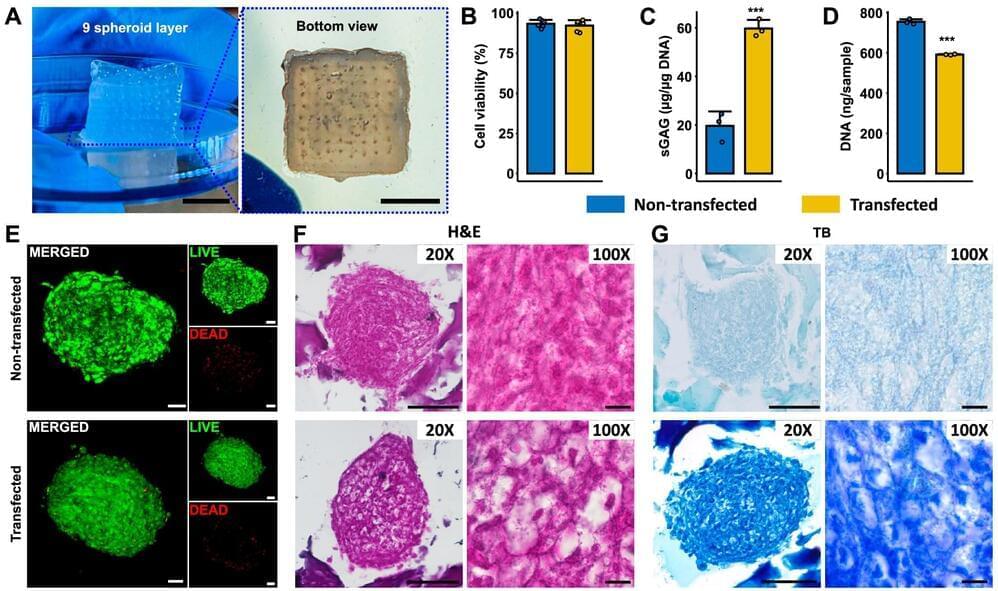Category: life extension – Page 119

Unlocking the secrets of collagen: How sea creature superpowers are inspiring smart biomaterials for human health
Major findings on the inner workings of a brittle star’s ability to reversibly control the pliability of its tissues will help researchers solve the puzzle of mutable collagenous tissue (MCT) and potentially inspire new “smart” biomaterials for human health applications.
The work is directed by Denis Jacob Machado—assistant professor in Bioinformatics at The University of North Carolina at Charlotte Center for Computational Intelligence to Predict Health and Environmental Risks (CIPHER)—and Vladimir Mashanov, staff scientist at Wake Forest Institute for Regenerative Medicine.
In “Unveiling putative modulators of mutable collagenous tissue in the brittle star Ophiomastix wendtii: an RNA-Seq analysis,” published recently in BMC Genomics, the researchers describe using advanced transmission electron microscopy (TEM), RNA sequencing, and other bioinformatics methods to identify 16 potential MCT modulator genes. This research offers a breakthrough towards understanding precisely how echinoderms quickly and drastically transform their collagenous tissue. The first author of the paper, Reyhaneh Nouri, is a Ph.D. student in UNC Charlotte’s Department of Bioinformatics and Genomics.

Chaperone-mediated autophagy as a modulator of aging and longevity
Chaperone-mediated autophagy (CMA) is the lysosomal degradation of individually selected proteins, independent of vesicle fusion. CMA is a central part of the proteostasis network in vertebrate cells. However, CMA is also a negative regulator of anabolism, and it degrades enzymes required for glycolysis, de novo lipogenesis, and translation at the cytoplasmic ribosome. Recently, CMA has gained attention as a possible modulator of rodent aging. Two mechanistic models have been proposed to explain the relationship between CMA and aging in mice. Both of these models are backed by experimental data, and they are not mutually exclusionary. Model 1, the “Longevity Model,” states that lifespan-extending interventions that decrease signaling through the INS/IGF1 signaling axis also increase CMA, which degrades (and thereby reduces the abundance of) several proteins that negatively regulate vertebrate lifespan, such as MYC, NLRP3, ACLY, and ACSS2. Therefore, enhanced CMA, in early and midlife, is hypothesized to slow the aging process. Model 2, the “Aging Model,” states that changes in lysosomal membrane dynamics with age lead to age-related losses in the essential CMA component LAMP2A, which in turn reduces CMA, contributes to age-related proteostasis collapse, and leads to overaccumulation of proteins that contribute to age-related diseases, such as Alzheimer’s disease, Parkinson’s disease, cancer, atherosclerosis, and sterile inflammation. The objective of this review paper is to comprehensively describe the data in support of both of these explanatory models, and to discuss the strengths and limitations of each.
Chaperone-mediated autophagy (CMA) is a highly selective form of lysosomal proteolysis, where proteins bearing consensus motifs are individually selected for lysosomal degradation (Dice, 1990; Cuervo and Dice, 1996; Cuervo et al., 1997). CMA is mechanistically distinct from macroautophagy and microautophagy, which, along with CMA, are present in most mammalian cells types.
Macroautophagy (Figure 1 A) begins when inclusion membranes (phagophores) engulf large swaths of cytoplasm or organelles, and then seal to form double-membrane autophagosomes. Autophagosomes then fuse with lysosomes, delivering their contents for degradation by lysosomal hydrolases (Galluzzi et al., 2017). Macroautophagy was the first branch of autophagy to be discovered, and it is easily recognized in electron micrograms, based on the morphology of phagophores, autophagosomes, and lysosomes (Galluzzi et al., 2017).

Researchers identify genes linked to muscle aging and sarcopenia
Scientists have identified previously unreported genes which appear to play a key role in the muscle ageing process.
It is hoped that the findings from the Nottingham Trent University study could be used to help delay the impact of the ageing process.
Muscle ageing is a natural process which occurs in everyone, causing people to lose muscle mass, strength and endurance as they get older – and is linked to increasing falls and physical disabilities.

Mimicking Exercise: Gene Control Found To Stimulate Muscle Growth
A recent study investigates the relationship between exercise and the expression of MYC in skeletal muscles over time, revealing that even minimal doses can promote muscle growth without physical activity.
Researchers have long known that there is a relationship between the cancer-associated gene MYC (pronounced “Mick”) and exercise adaptation. When human muscles are exercised, MYC is found to increase transiently in abundance over 24 hours. But as we age, the MYC response to exercise is blunted, perhaps explaining a reduced ability to recover from exercise and maintain or gain muscle.
Knowing the precise mechanisms by which MYC drives muscle growth could prove instrumental in creating therapies that reduce muscle loss from aging, potentially improving independence, mobility, and health.
GeroScience: Exploring the Gero-Oncology Perspective: Unraveling the Intersection of Aging Research and Cancer Biology
Guest Editors: Prof. Robert Mannel, MD, University of Oklahoma HSC Prof. Judith Campisi, PhD, Buck Institute for Research on Aging Prof. Balazs Gyorffy, MD, PhD, Semmelweis University Prof. Anna Csiszar, MD, PhD, University of Oklahoma HSC Prof. Peter Bai, PhD, University of Debrecen.
The field of geroscience, focusing on the biology of aging, has revealed fascinating insights into the intricate relationship between aging and cancer. As the incidence of numerous cancer types exponentially increases with advancing age, understanding the cellular and molecular mechanisms underlying aging becomes crucial in deciphering the genesis and progression of cancer. We invite researchers to submit papers that shed light on specific mechanisms of aging that play pivotal roles in the development and progression of cancer, serve as targets for cancer treatments and contribute to the side effects of cancer therapies. Additionally, we are also interested in exploring the potential of aging-related biomarkers, including gene expression profiles associated with aging processes, as predictors of cancer survival.


The impact of inactivation of the GH/IGF axis during aging on healthspan
By Sher Bahadur Poudel & Shoshana Yakar et al.
Several mouse lines with congenital growth hormone (GH)/insulin-like growth factor-1 (IGF-1) axis disruption have shown improved health and extended lifespan. The current study investigated how inactivating this axis, specifically during aging, impacts the healthspan. We used a tamoxifen-inducible global GH receptor (GHR) knockout mouse model starting at 12 months and followed the mice until 24 months of age (iGHRKO12–24 mice). We found sex-and tissue-specific effects, with some being pro-aging and others anti-aging. Measuring an array of cytokines in serum revealed that inactivation of the GH/IGF-1 axis at 12 months did not affect systemic inflammation during aging. On the other hand, hypothalamic inflammation was significantly reduced in iGHRKO12–24 mice, evidenced by GFAP+ (glial fibrillary acidic protein, a marker of astrocytes) and Iba-1+ (a marker for microglia). Liver RNAseq analysis indicated feminization of the male transcriptome, with significant changes in the expression of monooxygenase, sulfotransferase, and solute-carrier-transporter gene clusters. Finally, we found impaired bone morphology, more pronounced in male iGHRKO12–24 mice and correlated with GH/IGF-1 inactivation onset age. We conclude that inhibiting the GH/IGF-1 axis during aging only partially preserves the beneficial healthspan effects observed with congenital GH deficiency.
Inactivating the GH axis during aging has sex-and tissue-specific effects on healthspan. Deleting the GH receptor (GHR) in the entire body at 12 months of age led to feminizing the male liver transcriptome, significantly altering the expression of p450 and sulfotransferase gene clusters. While GHR deletion during aging did not impact systemic inflammation, it was linked to reduced hypothalamic inflammation. Additionally, we observed impaired bone morphology, particularly in male mice, which correlated with the age at which GH/IGF-1 inactivation began. Our findings suggest that inhibiting the GH axis during aging only partially maintains the beneficial healthspan effects seen with congenital GH deficiency.

5 Best Probiotics for Longevity
Did you know the “probiotic” sodas Olipop and Poppi are both facing lawsuits for exaggerating their gut health claims? Jessica did a deep dive to discover which probiotics for longevity are *actually* scientifically backed:
Ignore the gut health hype & choose the best probiotics for longevity based on science– Microbial strains, capsule types & ingredients matter!

Bioprinting technique creates functional tissue 10x faster
Three-dimensional (3D) printing isn’t just a way to produce material products quickly. It also offers researchers a way to develop replicas of human tissue that could be used to improve human health, such as building organs for transplantation, studying disease progression and screening new drugs. While researchers have made progress over the years, the field has been hampered by limited existing technologies unable to print tissues with high cell density at scale.
A team of researchers from Penn State have developed a novel bioprinting technique that uses spheroids, which are clusters of cells, to create complex tissue. This new technique improves the precision and scalability of tissue fabrication, producing tissue 10-times faster than existing methods. It further opens the door to developing functional tissues and organs and progress in the field of regenerative medicine, the researchers said.
They published their findings in Nature Communications.